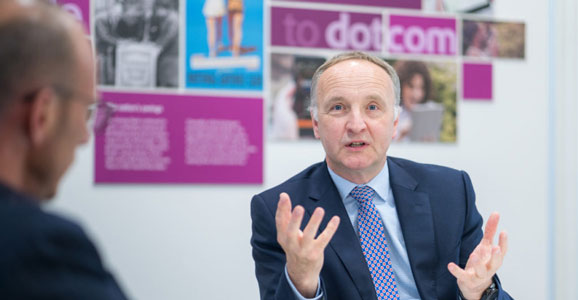During the financial crisis, the UK government stepped in to nationalise some of the country's biggest banks; coming onto the public sector’s books, they joined a retail savings bank set up by the Treasury over 150 years ago. Matt Ross meets Ian Ackerley, chief executive of NS&I.
Image courtesy: Brenna Duncan.
Ever since Margaret Thatcher sold off Britain’s state-owned enterprises in the 1980s privatisations, the UK government has owned fewer businesses than most other developed nations. While many states operate major companies – Norwegian oil firm Equinor and French rail provider SNCF are obvious examples – the UK’s nearest equivalents are the BBC and the Royal Bank of Scotland, the latter having been reluctantly nationalised during the financial crisis. Yet in the UK’s finance sector – the ferociously free-market heart of its services-led economy – the government operates a savings bank holding £167bn (US$204bn) in investments. And this isn’t a state-owned business, but part of central government: a non-ministerial department and executive agency, controlled by HM Treasury and led by civil servants. Operating in finance markets alongside the City’s multinational banks and investment firms, National Savings & Investments (NS&I) provides savings and financial services to some 25 million customers. In an era when the UK no longer owns even its postal service – having off-loaded Royal Mail in 2013 – it is a surprising organisation to find on the government’s books. Few other countries own savings banks. “There are some similar organisations around, I understand, but it isn’t common,” says chief executive Ian Ackerley, who joined NS&I in March 2017 after a career in financial services – including stints at Barclays, Sun Life and Virgin Money. Yet the UK has owned a retail savings provider since 1861, when Chancellor of the Exchequer William Gladstone established the Post Office Savings Bank. Take a look at how its successor body NS&I serves the Treasury, and its value quickly becomes clear. “There are fundamentally three things we do,” explains Ackerley. “One is raising cost-effective debt finance for government. The second is delivering services to other government departments. And the third is helping to deliver retail savings policy.”
An in-house lender
So NS&I’s core role is to attract savings from UK citizens, enabling it to provide loan finance to the Treasury – and thus reduce government’s need to issue bonds. As Ackerley points out, “there are factors that drive the bond market that don’t impact retail savings” – meaning that NS&I can sometimes provide finance more cheaply or flexibly than bond markets. Twice a year, the Treasury assesses its tax revenues, predicts its borrowing requirements, and decides how to spread borrowing between gilts, government bonds, and NS&I finance. “We put a bid in, the Debt Management Office that handles gilts puts a bid in, and [Treasury officials] look at the relative cost and decide how to split it,” explains Ackerley. That calculation creates a target sum for NS&I to provide – and this target can change dramatically from one period to the next, falling recently from £13bn to £8bn (US$16bn to $10bn). “If tax receipts, for example, increase a lot, the government might reduce the target,” says Ackerley; NS&I then has to make its savings products less attractive to consumers, reducing the amount of money coming in. In these circumstances, he adds, “we’ll probably have to reposition products or even potentially remove them from sale, in order to be able to reduce the inflows.”
Trim your sales

“There are points where a lot of money will come to NS&I, and that won’t necessarily be because we’re deliberately chasing it, but because we offer a 100% capital guarantee backed by the Treasury.” (Image courtesy: Brenna Duncan).
Complicating the picture, NS&I is also charged with ensuring that its products aren’t so attractive that they represent unfair competition to private businesses. The company decides with the Treasury how to pitch its offer relative to those of its competitors, agreeing “where we’ll appear in the league tables, in terms of interest rates – and explicitly that won’t be at the top of the table, because that does run the risk of us distorting the market.” And it must factor into these calculations not only the relative strength of its product range, but also wider economic and market factors that can affect NS&I’s attractiveness to savers. “There are points where a lot of money will come to NS&I, and that won’t necessarily be because we’re deliberately chasing it, but because we offer a 100% capital guarantee backed by the Treasury,” Ackerley explains. “In times of disruption, that’s something which customers value a lot.” In case you hadn’t noticed, the UK is currently going through a period of disruption. So NS&I is constantly engaging in a three-way balancing act, weighing the interests of its customers against those of taxpayers and the finance sector: offering higher interest rates, for example, pleases savers but raises the cost of lending to the Treasury and squeezes competitors. And there’s another consideration to throw into the mix; for in its retail savings policy role, NS&I uses its financial weight as a policy tool – influencing the wider market in the interests of savers around the country.
Celebrating savers
“We do at times take steps which we think will improve the lot of customers, sending a signal to the market,” says Ackerley. So when the Bank of England raised interest rates by a quarter-point in November 2017, NS&I passed on the whole rise to savers – putting pressure on private banks to do the same. “And when we launched the Investment Guaranteed Growth Bond, that was priced at the top of the market – which had the impact of rates across the market rising,” he adds. “That has helped reward savers.” Increasing NS&I’s interest rates, of course, makes its finance pricier for government: these decisions were “very much part of helping government to deliver policy, as opposed to raising cost-effective finance,” comments Ackerley. But this policy role does form a key aspect of NS&I’s work – particularly the task of strengthening Britain’s weak savings culture. Over the years, Ackerley points out, property price inflation and readily accessible loans have reduced people’s commitment to saving. “Easy access to debt finance enabled people to borrow readily, so the need to save in order to be able to buy declined – and that, along with other pressures on people’s budgets, led them to stop saving,” he says. “That culture is broken, and we’re doing our bit to try to get it back.” But today’s unaffordable house prices, he adds, have created a generation of young people “who just can’t get on [the property] ladder, and therefore that way of creating wealth is not available to them.” And NS&I has another reason for focusing on young people: “We’re really respected and loved by, by and large, an older customer base,” he points out. “That’s a real worry for the long-term sustainability of NS&I.” In a bid to encourage more young savers, NS&I has dropped the minimum investment in Premium Bonds – its flagship savings scheme, whose customers enter a prize draw rather than receiving interest – from £100 to £25 (US$123 to $31). “We’ve had about a 25% increase in the number of active under-25s since we’ve made those changes; now it’s about pushing on,” comments Ackerley.
Handling money for cash
So in raising finance and delivering policy, NS&I pursues various goals – navigating the tensions between them – while coping with volatility in both its Treasury targets and its market environment. Happily, its third role provides a more predictable income stream: the agency provides services to other government departments, using its expertise and infrastructure to build the financial IT systems underpinning transactional public services. NS&I’s Government Payment Services (NS&I GPS) arm was set up a decade ago, Ackerley explains. “It leverages our expertise: we’re capable of running payment services, verifying people’s identity, building the machine,” he says. “So we take what is a marginal activity for many departments – and, potentially, something which is therefore not as efficiently run as it could be – and offer them a better service at a lower cost. We’ve got a bigger machine, so we’ve got economies of scale and can create a saving in our customer departments.” NS&I’s position as a part of government is also helpful, reducing the complexity and cost of the procurement process. And Ackerley says that ‘open banking’ – the use of ‘APIs’ to create real-time data links supporting financial services – opens up new opportunities. NS&I GPS could, for example, draw data directly from service users’ bank accounts “rather than relying on customers to send in bank statements, which someone’s then got to pore through.” However, it hasn’t all been plain sailing for NS&I GPS: HM Revenue & Customs’ NS&I-run tax-free childcare system suffered from a delayed launch and ongoing technical problems: Ackerley points out that it’s now “reliable and consistent: we’re very sorry for all those customers who were inconvenienced.” The scheme involved linking “an awful lot of IT systems across the HMRC estate and our estate,” he explains, and a judicial review of the tendering process meant that in its early stages “the two teams couldn’t work very closely together, which got the project off to a more difficult start.” Having “learned lessons from the complexity of tax-free childcare,” says Ackerley, when NS&I GPS won its next HMRC commission – Help to Save, an award-winning savings scheme for people on low incomes who are claiming certain benefits – “we worked really closely with HMRC, and looked at the overall structure and the way the solutions are protected. One of the critical things we did there was to make it much simpler: if you get the design right at the top, and you’re really clear on what you’re going to build, then it’s much easier to deliver the right solution.”
Incentivising Atos

“The real challenge in the UK now is going to be around what’s going to happen to the economy based on much bigger, broader political decisions that are going to happen in the next few months. How we exit Europe will have a big effect.” (Image courtesy: Brenna Duncan).
The same applies to outsourcing civil service operations – and NS&I has just extended its contract with services provider Atos, which since 2014 has run most of the agency’s business processes: just 200 of NS&I’s staff are civil servants, with the remaining 1600 employed by Atos. It’s been a successful partnership, says Ackerley: one which has cut operating costs by around £1bn (US$1.25bn), while shifting service delivery from the Post Office to online channels. Agreeing the 2021-24 extension in early 2019, says Ackerley, has maximised Atos’s incentives to keep on developing the business. “At the end of an outsourced contract, it no longer makes sense for the outsourcing partner to make major investments because they’re never going to see the return,” he explains. “Signing the extension this year gives them five years – and that enables them to make big, strategic decisions.” The extension agreement, he adds, also includes profit-sharing provisions – creating a “number of mechanisms so that if we hit milestones for the business, we’ll both benefit.” And Ackerley – having observed debacles such as the 2018 collapse of major government supplier Carillion – has tried to ensure that Atos makes a reasonable profit: “We’ve seen in other sectors that if the franchisee is not making money, then the risk is to the service,” he says. “And ultimately, this is our business. In 2024 we’ll retender it, and we want a really healthy operation so that it’ll be an attractive proposition for other people to bid on.”
A stable base in turbulent times
For Ackerley, NS&I’s GPS arm and its relationship with Atos provide a solid base for an organisation whose retail operations must bend around ever-changing customer demands, policy goals, Treasury decisions and finance markets. Having weathered the financial crisis while running Virgin Money’s investments and pensions business, Ackerley believes that the UK’s financial system at least is more stable than it was in 2007: “The financial services sector has learned its lessons, and the regulatory changes have made a big difference,” he says. “We’re in a much more secure place with the banking sector.” Today, though, the UK faces a new set of economic risks: those rooted in its agonising, stumbling course towards Brexit. “The real challenge in the UK now is going to be around what’s going to happen to the economy based on much bigger, broader political decisions that are going to happen in the next few months,” he comments. “How we exit Europe will have a big effect.” “During the financial crisis, there was a huge inflow of money into NS&I because it was secure and people were worried about the banks,” he adds. “At a time like this with Brexit, there tends to be a bit of dash for cash – with customers perhaps coming out of investment markets, and a lot more money flowing into the savings space.” So NS&I is, no doubt, preparing for a Brexit-induced stampede of savers. But this is, fundamentally, business as usual: NS&I and its predecessor bodies have been dealing with political and economic shocks since the first Post Office Savings Bank opened its doors. And the value they provide is clear; for HM Treasury, a longstanding sceptic of publicly-owned businesses, has for over 150 years been the proud owner of a savings bank.




